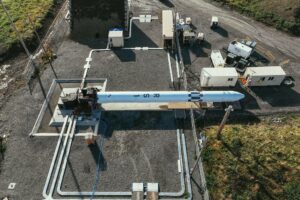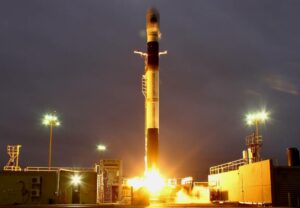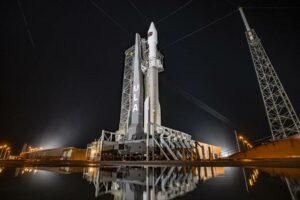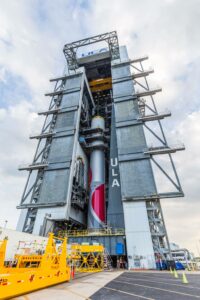
Something very interesting has happened recently in the usually staid diplomatic world of outer space security. Part of it was almost expected: A two-yearlong, major multilateral process to discuss what to do about threats to space systems came to a conclusion without agreement on a way forward, or even on a summary report, partially due to bombastic diplomatic language from the Russian delegation. But along the way, a large number of countries outside the West, who have normally been critical of the U.S. position on these issues, responded positively to efforts from Washington to reshape the conversation out of the long-standing deadlock and toward progress on space security and stability.
For decades, the global diplomatic debate on space security issues has been stuck in neutral, going nowhere. The root cause was opposing views between the major players on what the biggest threat was to space security and stability, and how to address it. Russia and China argued that it was weapons placed in outer space, and proposed a new treaty banning them. The United States and its allies strongly opposed the draft treaty on the grounds that it was unverifiable and that there was no weaponization of space taking place.
In this debate, most developing countries tended to side with the Russian and Chinese position that weapons in space were the biggest issue, with the United States being cast as the main protagonist for the weaponization of outer space. Russia and China had the diplomatic upper hand, as they had proffered a draft treaty and could portray themselves as at least attempting to help, whereas the United States’ position was to oppose the draft Russia-China treaty without offering any alternatives.
As a result, the United States often found itself playing diplomatic defense on major votes on space security within the United Nations General Assembly.
That all began to change several years ago when the United States and its allies changed tack and began talking about space security not in terms of how to classify space objects as weapons but in terms of identifying behaviors deemed responsible — or not. That new approach helped lead to the creation of a new open-ended working group within the U.N. to discuss potential norms, principles and rules of behavior to reduce space threats that had widespread participation from more than 70 countries.
In April 2022, the discussion was really shaken up when the United States announced a voluntary commitment not to conduct destructive direct-ascent anti-satellite, or DA-ASAT, missile tests. Since then, 34 additional countries have joined in this voluntary commitment, and it has gained widespread international support.
In December 2022, the United States led a U.N. General Assembly resolution supporting the commitment not to conduct DA-ASAT missile tests, which overwhelmingly passed by a vote of 155 in favor, 9 against, and 9 abstentions. In this case, Russia and China, two of those voting against, were on the losing side of a major U.N. vote on space security.
This growing global focus on destructive DA-ASAT testing is in large part due to the long-lasting threat orbital debris from such tests pose to satellites operated by all nations. In the annual Global Counterspace Capabilities report that we co-edit, we document the more than 6,850 pieces of orbital debris created by destructive anti-satellite testing in space over approximately the last 60 years, of which more than 3,400 pieces are still in orbit and pose daily risks to critical satellites and human spaceflight. These tests have also created thousands of additional pieces of debris too small to be tracked that still could damage other spacecraft.
Destructive DA-ASAT testing is also an example of irresponsible behavior discussed by the open-ended working group on reducing space threats, which took place over four weeklong sessions in 2022 and 2023. While the group was unable to reach consensus on the final report, largely due to intransigence by the Russian delegation, the process had significant success. It socialized the idea of focusing on behavior. It brought many more countries into the discussion and popularized the role of non-legally binding instruments as one tool in an overall toolkit to bulwark space security.
And for the United States, it showed the value of participating in these discussions and putting legitimate proposals on the table, instead of just saying no to proposals it could not support.
It’s unclear what comes next for formal negotiations of space threats. Another U.N. process, this one focused firmly on the old-school space weaponization approach favored by Russia and China, gets underway in November and is unlikely to yield meaningful results. But for the United States, there is a clear opportunity to build on the growing global momentum created by its ground-breaking pledge. For the first time in decades, the world is on Washington’s side to help make space more secure and sustainable, if only it has the political will to lead.
Victoria Samson is a director at the Secure World Foundation. She previously served as a senior analyst for the Center for Defense Information. Brian Weeden is the director of program planning at the Secure World Foundation. He served as an officer in the U.S. Air Force working in space and intercontinental ballistic missile operations.
- SEO Powered Content & PR Distribution. Get Amplified Today.
- PlatoData.Network Vertical Generative Ai. Empower Yourself. Access Here.
- PlatoAiStream. Web3 Intelligence. Knowledge Amplified. Access Here.
- PlatoESG. Automotive / EVs, Carbon, CleanTech, Energy, Environment, Solar, Waste Management. Access Here.
- PlatoHealth. Biotech and Clinical Trials Intelligence. Access Here.
- ChartPrime. Elevate your Trading Game with ChartPrime. Access Here.
- BlockOffsets. Modernizing Environmental Offset Ownership. Access Here.
- Source: https://www.defensenews.com/opinion/2023/09/14/us-seizes-initiative-on-space-security-for-the-first-time-in-decades/
- :has
- :is
- :not
- $UP
- 2022
- 2023
- 400
- 60
- 70
- 9
- a
- About
- Additional
- address
- against
- ago
- Agreement
- AIR
- Air Force
- All
- almost
- along
- also
- alternatives
- an
- analyst
- and
- annual
- Another
- any
- approach
- approximately
- April
- ARE
- argued
- AS
- Assembly
- At
- attempting
- BE
- been
- began
- being
- between
- Biggest
- binding
- Brian
- brought
- build
- but
- by
- came
- case
- Cause
- Center
- change
- changed
- China
- chinese
- Classify
- clear
- comes
- commitment
- conclusion
- Conduct
- Consensus
- Conversation
- could
- countries
- created
- creation
- critical
- daily
- damage
- debate
- decades
- December
- deemed
- Defense
- delegation
- developing
- Developing Countries
- Director
- discuss
- discussed
- discussion
- discussions
- do
- document
- draft
- due
- efforts
- Even
- example
- expected
- favor
- final
- firmly
- First
- first time
- Focus
- focused
- focusing
- For
- Force
- formal
- Forward
- found
- Foundation
- four
- from
- gained
- General
- Global
- going
- ground-breaking
- Group
- Growing
- had
- hand
- happened
- Have
- he
- help
- helped
- How
- How To
- HTTPS
- human
- idea
- identifying
- if
- images
- in
- information
- Initiative
- instead
- instruments
- InterContinental
- interesting
- International
- into
- issue
- issues
- IT
- ITS
- itself
- joined
- jpg
- just
- language
- large
- largely
- Last
- lead
- least
- Led
- legitimate
- long-standing
- losing
- Main
- major
- make
- many
- meaningful
- Momentum
- more
- most
- multilateral
- Nations
- negotiations
- Neutral
- New
- next
- no
- normally
- norms
- November
- number
- objects
- of
- offering
- Officer
- often
- on
- ONE
- only
- operated
- Operations
- Opportunity
- oppose
- opposed
- or
- Orbit
- Other
- out
- outer space
- outside
- over
- overall
- part
- participating
- participation
- pieces
- Place
- planning
- plato
- Plato Data Intelligence
- PlatoData
- players
- playing
- Pledge
- political
- position
- potential
- previously
- principles
- process
- Program
- Progress
- Proposals
- proposed
- protagonist
- Putting
- reach
- really
- recently
- reduce
- reducing
- report
- reshape
- Resolution
- responsible
- result
- Results
- risks
- Role
- root
- rules
- Russia
- russian
- s
- satellites
- saying
- secure
- security
- SEIZES
- senior
- sessions
- several
- she
- showed
- side
- significant
- since
- small
- Space
- spacecraft
- spaceflight
- Stability
- States
- Still
- strongly
- success
- such
- SUMMARY
- support
- Supporting
- sustainable
- Systems
- table
- taking
- talking
- terms
- Testing
- tests
- than
- that
- The
- The West
- the world
- Them
- themselves
- then
- There.
- These
- they
- this
- those
- thousands
- threat
- threats
- time
- to
- too
- took
- tool
- toolkit
- toward
- two
- u.s.
- U.S. Air Force
- unable
- Underway
- United
- united nations
- United States
- unlikely
- us
- usually
- value
- very
- views
- voluntary
- Vote
- votes
- Voting
- was
- washington
- Way..
- we
- Weapons
- weeklong
- were
- West
- What
- when
- whereas
- which
- while
- WHO
- widespread
- will
- with
- within
- without
- working
- Working Group
- world
- years
- Yield
- zephyrnet












